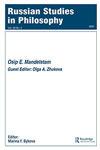Our Being on the Eve of the Twenty-First Century
IF 0.1
4区 哲学
Q4 Arts and Humanities
引用次数: 0
Abstract
ABSTRACT In this excerpt from his celebrated book From the Doctrine of Science to the Logic of Culture (1991), Bibler discusses a break in historical continuity due to fundamental changes in the social sphere. Dictatorships and wars are causing the resettlement of peoples and the need to understand foreign cultures in conjunction with one’s own while at the same time dwelling on the initial concepts of human life: human dignity, morality, and so forth. Interaction between different cultures (Europe, Asia, Africa) is taking place. Differences also exist between them and ancient, medieval, and modern-era European cultures. These interactions are visible in philosophy: We can take Aristotle or Nicholas of Cusa as our own interlocutors, though fundamentally different from us in terms of reasoning. Core changes are taking place in science, as well: Old theory is not being sublated by new theory, by Einstein and Bohr, but is becoming more well-rounded through it, while new theory is experiencing a combination of its ideas of the universal meaning of Galileo’s discoveries. Galileo is no less important than Einstein, and vice versa. The interconnection of various scientific explanations must be included in modern understanding. Reason proceeds from the beginnings of science, moves to the new, and returns to an understanding of reason itself. Science turns to its origins and arrives, oddly enough, in the future, at nonclassical and postclassical physics. Bibler also discusses cultural works that are closely intertwined with the personality of the creator and the audience. In this section, he touches on changes in the nature of labor, which shifts from joint labor to universal (as defined by Marx) when activities toward self-change (that is, creative activity) become decisive.二十一世纪前夕的我们
本文摘自比布勒的著名著作《从科学学说到文化逻辑》(1991),他讨论了由于社会领域的根本变化而导致的历史连续性中断。独裁统治和战争正在造成人民的重新安置,需要在了解外国文化的同时了解本国文化,同时思考人类生活的最初概念:人类尊严、道德等等。不同文化(欧洲、亚洲、非洲)之间的互动正在发生。它们与古代、中世纪和现代欧洲文化之间也存在差异。这些互动在哲学中是可见的:我们可以把亚里士多德或库萨的尼古拉斯作为我们自己的对话者,尽管在推理方面与我们根本不同。科学领域也在发生着核心的变化:旧的理论并没有被爱因斯坦和玻尔的新理论所扬弃,而是通过新理论变得更加完善,而新理论正经历着与伽利略发现的普遍意义相结合的思想。伽利略的重要性不亚于爱因斯坦,反之亦然。各种科学解释的相互联系必须包括在现代理解中。理性从科学的起点出发,走向新事物,回到对理性本身的理解。科学转向它的起源,奇怪的是,在未来,它到达了非经典和后经典物理学。Bibler还讨论了与创作者和观众的个性紧密交织在一起的文化作品。在这一节中,他谈到了劳动性质的变化,当自我改变的活动(即创造性活动)成为决定性的活动时,劳动性质从联合劳动转变为普遍劳动(如马克思所定义的)。
本文章由计算机程序翻译,如有差异,请以英文原文为准。
求助全文
约1分钟内获得全文
求助全文
来源期刊

RUSSIAN STUDIES IN PHILOSOPHY
PHILOSOPHY-
CiteScore
0.10
自引率
0.00%
发文量
14
期刊介绍:
Russian Studies in Philosophy publishes thematic issues featuring selected scholarly papers from conferences and joint research projects as well as from the leading Russian-language journals in philosophy. Thematic coverage ranges over significant theoretical topics as well as topics in the history of philosophy, both European and Russian, including issues focused on institutions, schools, and figures such as Bakhtin, Fedorov, Leontev, Losev, Rozanov, Solovev, and Zinovev.
 求助内容:
求助内容: 应助结果提醒方式:
应助结果提醒方式:


